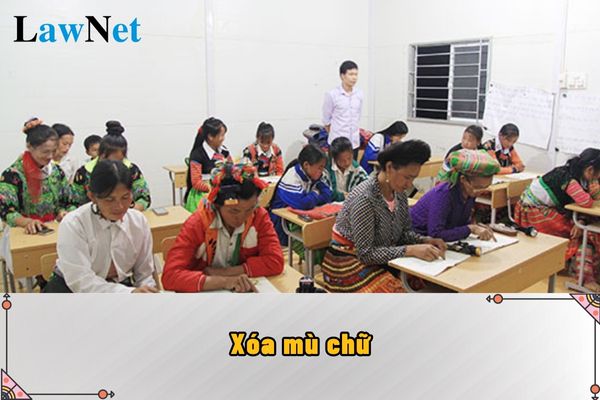Can a person aged 20 participate in literacy programs in Vietnam?
Can a person aged 20 participate in literacy programs in Vietnam?
According to Article 17 of Decree 20/2014/ND-CP, the subjects eligible for literacy programs are as follows:
Subjects for literacy programs
Subjects for literacy programs are individuals aged from 15 to 60 who are illiterate.
To participate in a literacy program, individuals must satisfy two conditions:
- Be aged from 15 to 60
- Be illiterate
Thus, comparing with the regulations, a 20-year-old who is also illiterate may participate in a literacy program.
What are rights and obligations of participants in literacy programs in Vietnam?
Currently, there is no specific legal document that stipulates the rights and obligations of participants in literacy programs.
However, we can refer to the rights and obligations of citizens in education as stipulated in Article 13 of the Education Law 2019, as participation in literacy programs is considered a right and obligation of every citizen.
Therefore, participants in literacy programs have the following rights and obligations:
Learning rights and obligations of citizens
1. Learning is the right and obligation of every citizen. Every citizen, regardless of ethnic origin, religion, belief, gender, personal characteristics, family background, social status or economic conditions, has equal rights of access to learning opportunities.
2. The State shall ensure social equality in education, create a safe educational environment, ensure inclusive education and enable learners to develop their potentials and talents.
3. The State shall give priority in enabling children with special backgrounds as prescribed in the Children Law, disabled and handicapped persons as prescribed in the Law on Persons with Disabilities and learners from poor and near-poor households to exercise their learning rights and obligations.
Additionally, the benefits of participants in literacy programs may depend on local policies.
Because according to Article 24 of Decree 20/2014/ND-CP, the funding for the implementation of universal education and literacy eradication is balanced in the annual state budget estimates according to decentralization and contributions from domestic and international organizations, businesses, individuals, and the community.

Can a person aged 20 participate in literacy programs in Vietnam? (Image from the Internet)
What are the regulations on literacy policies in Vietnam?
According to Article 2 of Decree 20/2014/ND-CP, the literacy policies are regulated as follows:
- The state prioritizes investment and facilitates educational institutions within the national education system to implement the mission of universal education and literacy eradication; encourages and facilitates international organizations, foreign individuals, and overseas Vietnamese to participate in implementing universal education and literacy eradication in Vietnam according to legal regulations.
- The state implements policies to support subjects eligible for tuition fee exemptions, reductions, and learning cost support when participating in universal education and literacy programs as specified.
- Individuals engaged in organizing, managing, teaching, and other tasks to implement universal education and literacy eradication are entitled to remuneration as per state regulations.
What are the three criteria for recognizing literacy after participating in a literacy program in Vietnam?
The criteria for recognizing literacy for individuals after participating in literacy programs are divided into levels as follows:
(1) Criteria for recognizing literacy proficiency (Article 19 of Decree 20/2014/ND-CP)
- Literacy proficiency level 1: Completion of the first phase of the literacy and continuing education program after literacy, or completion of grade 3 of the primary education program.
- Literacy proficiency level 2: Completion of the second phase of the literacy and continuing education program after literacy, or completion of the primary education program.
(2) Criteria for recognizing level 1 literacy eradication (Article 20 of Decree 20/2014/ND-CP)
- For communes: At least 90% of individuals aged from 15 to 35 recognized as having literacy proficiency level 1; for communes with special socio-economic difficulties, at least 90% of individuals aged from 15 to 25 recognized as having literacy proficiency level 1.
- For districts: At least 90% of communes recognized as achieving level 1 literacy eradication.
- For provinces: At least 90% of districts recognized as achieving level 1 literacy eradication.
(3) Criteria for recognizing level 2 literacy eradication (Article 21 of Decree 20/2014/ND-CP)
- For communes: At least 90% of individuals aged from 15 to 60 recognized as having literacy proficiency level 2; for communes with special socio-economic difficulties, at least 90% of individuals aged from 15 to 35 recognized as having literacy proficiency level 2.
- For districts: At least 90% of communes recognized as achieving level 2 literacy eradication.
- For provinces: 100% of districts recognized as achieving level 2 literacy eradication.

